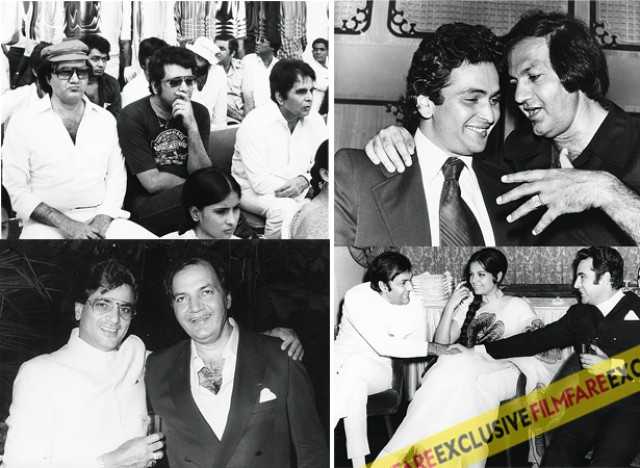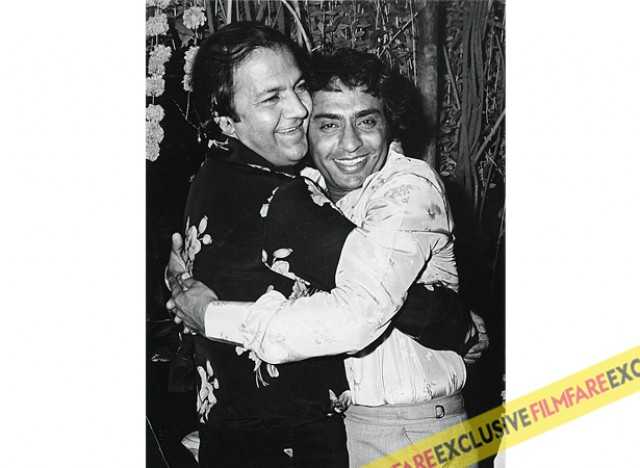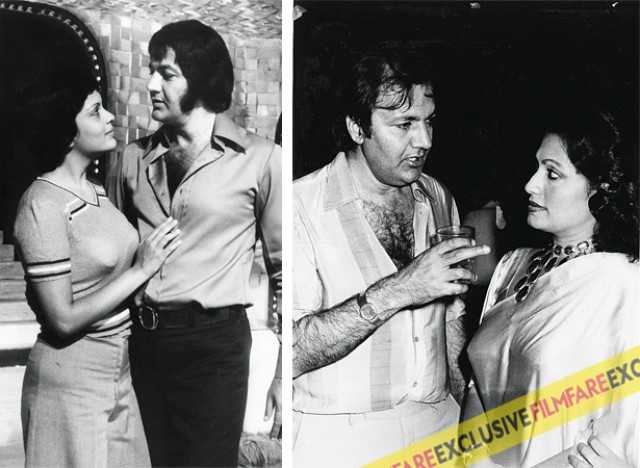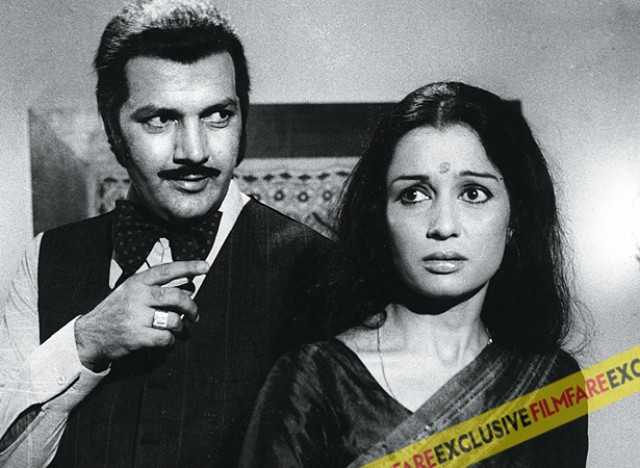Prem Chopra is talking to friend and filmmaker Manoj Kumar over the phone even as he gestures me to sit. He’s taking down a homeopathic prescription from Manoj, an advocate of this alternative stream of medicine, for wife Uma who’s suffering from a niggling backache. Call over, he strikes a casual conversation. Two things strike you about him as he chats. First, his genteel disposition – totally incongruent with the vile onscreen person that once intimidated women audiences. When a menacing Prem assaulted the heroine dismissing her pleas saying, “Itni acchi cheez Bhagwan ke liye kaise choddh doon?” he sent down ripples of fear. Another thing is the equanimity with which he reviews his career – no delusions, no regrets.
Five decades, nearly 400 films and Prem Chopra is still around. Recently, seen in films like Agent Vinod and Golmaal 3, where he parodied himself, he’s now looking forward to Tun Tun Vs Patel. “In Rocket Singh – Salesman Of The Year, I played Ranbir Kapoor’s grandfather. In Tun Tun..., Rishi Kapoor, my good friend, is playing my son. So the circle is complete,” smiles the 79-year-old actor who’s also doing Ganesh Acharya’s Hey Bro. “I believe in adapting to the changing times. I’ve known actors who refused to bend and were thrown out,” he explains his switch from playing a baddie to a character actor. “No one obliges you here. There are no free lunches. No amount of chamchagiri, no amount of camp baazi can take you anywhere. Only hard work can! Great filmmakers, who made the lives of so many actors, couldn’t do much for their children. If you deliver the goods you last, or else you’re chucked out,” he spells out the survival rules.

(clockwise) With Manoj Kumar and Dilip Kumar at a charity cricket match, With Rishi Kapoor, With Mumtaz and Feroz Khan and With Jeetendra
DRAMATIC EFFECT
Young Prem Chopra grew up in the quiet environs of Shimla after his family moved to the small town from Lahore after the Partition. The third child of Ranbirlal and Rooprani Chopra, among six siblings, Prem chose performing arts in college. “Shimla had a strong theatre movement during the ’50s. Boys from English medium schools could act and debate with confidence in college. But I was a flop because I just mugged up my lines,” he smiles. Prem’s ultimate dream was films, which is why he came to Mumbai in the early 1960s. He joined the Times of India’s circulation department. In his free time, he did the studio rounds.
THE BREAK
He made his debut with the Bharat Bhushan-starrer Mud Mud Ke Na Dekh in 1960. The same year he did the Punjabi film Chaudhary Karnail Singh, a love story, which won the National Award. But his sights were set on Hindi films. “I used to frequent Mehboob Studio. One day Mehboob Khan saab saw me sitting in the garden. He said, ‘Come here regularly. I’ll give you a break!’ But he wasn’t keeping well. His Son of India (1962) had flopped. I wondered when he’d cast me.” A desperate Prem accepted Raj Khosla’s Woh Kaun Thi (1964) – a thriller where he played the bad guy. “Mehboob saab, the chief guest at the premiere, chided me, “Why didn’t you wait? Saala, ab tum villain ban jaaoge (now on you’ll become a villain)!”
MANOJ KUMAR’S INFLUENCE
Prem then did Manoj Kumar’s Shahid (1964) where he played Bhagat Singh’s brother Sukhdev. “Rajesh Khanna, the winner of the Filmfare talent contest, was to play Sukhdev in Bhagat Singh. But this character had grey shades. So the panel of producers, who wanted to sign him as a hero, told him the negative image wouldn’t work,” he adds. “Rajesh had to back out. Manoj then approached me. Shaheed was a hit. And there was no looking back.” Prem followed this with Nasir Hussain’s Teesri Manzil, Raj Khosla’s Mera Saaya (both in 1966) and Manoj Kumar’s Upkaar (1967) after which he quit his job at TOI. “Manoj contributed heavily to my career. I did many films with him beginning from Dr Vidya (director Mohan Sehgal), Shahid, Upkar, Yaadgaar, Purab Aur Paschim and Kranti and Sohanlal Kanwar’s Sanyasi and Be-Imaan.”
Prem goes on to recall his early ‘fan’ moment. “Once we were shooting in Kashmir for Aamne Saamne (1967). Fans had gheraoed Shashi Kapoor and Sharmila Tagore for autographs. They wondered who I was. Some confused me with Mehmood, some with Sunil Dutt. But they asked for my autograph too.
I was only too happy. But when I’d take the book to sign, Shashi would pull it away asking them to first say who I was. So when Shashi was in the midst
of the shot, I quickly took their books and autographed ‘Prem Chopra’ in bold letters,” he beams.
THE SECRET OF DILIP KUMAR
With Dilip Kumar he first appeared in Dastaan (1972). “Dilip saab had a strange kashish (charm). As a youngster I had watched every film of his. His underplay was amazing,” he says. “On the set of Dastaan I kept looking at Dilip saab from a distance. He came up to me, hugged me and said, “Let’s do good work together!” I realised he was not only a good actor but a fine person too. We enjoyed sher-o-shayri.” Prem then did Bairaag Kranti and Duniya in the ’80s with the thespian. “Dilip saab kept rehearsing a shot till he was satisfied. There was hard work behind his ‘effortless’ performance. Jaise duniya ke liye ek hi chaand aur ek hi suraj hai, waise hamari industry ke liye ek hi Dilip Kumar hai. Other actors may have a bigger body of work. But Dilip saab brought dignity to the actors’ community.”

With Ranjeet
THE MAGIC OF DEV ANAND
Prem also had a line-up of films with Dev Anand including Hare Rama Hare Krishna, Des Pardes, Lootmaar and Chhupa Rustam during the ’70s. “If you were to work with Dev saab for 10 days, on the 11th day, you’d be walking like him and talking like him. He was so inspiring,” he says. “Once I asked him that despite flops, how he managed to remain so calm. He replied, ‘I’ve no interest in alcohol, food or anything else. My passion is films. But once a film is released, it’s over. The past is gone, the future is uncertain; we have just this moment - today. So enjoy it!’ The day after a film’s release Dev saab would be on the table writing another script.”
THE REAL RAJESH KHANNA
Prem Chopra’s rise as a super villain coincided with Rajesh Khanna’s rise to superstardom. As his antithesis in Raj Khosla’s Do Raaste (1969), he heralded the Rajesh-Prem team and backed it with Kati Patang in the same year. The duo went to work in around 19 films, the prominent ones being Ajanabee, Prem Nagar, Daag: A Poem of Love, Mehbooba, Souten and Maqsad (between 1969 – 1984). “Rajesh Khanna and I were considered a lucky pair for distributors,” he says just as his pairing with siren Bindu also added weight to a project. He confides, “Sadly, Rajesh Khanna was a ‘misunderstood man’. Kaan ke bhi kachhe the… he’d get influenced by what people said. But he remained focused on his work. He’d take his work home, even though he drank to glory. He arrived late on the set and people would tolerate it. He’d call producers to his sets and have them wait indefinitely. Of course, he was amiable towards them,” he shares. “Later, when his career went downhill, he went into isolation. I tried contacting him but he was not receptive. I thought it was best to give him his space and let him be happy in his world.”
BOND WITH AMITABH BACHCHAN
Prem enjoyed a good run with Amitabh Bachchan beginning from Pyar Ki Kahani in 1971 to Gehri Chaal, Do Anjaane (won the Filmfare Best Supporting Actor Award for his role), Trishul, The Great Gambler, Dostana, Naseeb and Andhaa Kanoon in the ’80s. Prem recounts, “Once the late Navin Nischal, my neighbour, invited me for the preview of Parwana (1971) at Dimple theatre. After watching it, I told him, “This film won’t run! But who is this tall boy? He will spell trouble for other heroes!”
During his days of struggle, Amitabh would be often replaced – more so with Sanjay Khan reveals Prem. “Distributors would refuse to touch his reels. But even in those days he had tremendous self-confidence. Once we were shooting for Gehri Chaal (1973). Director Sridhar, Amitabh and I were drinking. Sridhar said, ‘I’ll be finished if this film doesn’t work’. Amitabh pepped him up saying, ‘I’ve been a failure but I refuse to give up. I’m confident that I’ll make it and to the top’.” Prem is all admiration for the superstar’s humility. “He minds his own business. He doesn’t gossip nor does he talk ill of anyone. That’s the secret of his success,” he says. “Years ago, he was shooting in a desert. He travelled the distance to find a phone booth to wish me on my birthday. I was so touched. Even today, he’s the first to wish me on my birthday.”
CAREER CURVE
His cameo in Raj Kapoor’s Bobby in 1973, where he played ‘Prem Chopra’ brought him great popularity. Through the ’70s and ’80s, he went on to join the coterie of top villains including Ranjeet, Ajit, Amrish Puri and Amjad Khan. “I never regretted playing the villain. I made every role interesting. Like I used a naqli eye in Kala Sona (1975) or would bring in a comic angle to the villainy,” he says. “But I do regret losing Himmatwala. I was to play the role played by Kader Khan saab. But my dates had been allotted for Rahul Rawail’s Betaab. Himmatwala was a big hit. Since, Kader saab wrote the film, he gave an edge to his character.” Through the ’90s, he was part of hits like Phool Bane Angaarey, Prem Pratiggya and Chori Chori Chupke Chupke in which he was no longer the villain. “There comes a lull in your career, where you believe you are over. But I kept on doing whatever came my way. I attribute my success to adaptability,” says the actor who was later seen in affable roles in Koi… Mil Gaya, Bunty Aur Babli and Money Hai Toh Honey Hai in the new millennium.

With Zeenat and Bindu
WOMEN & ME
With the torment that he inflicted on heroines on screen during his heyday, it was but natural that Prem’s reputation preceded him. “Once my father and I were walking in a garden in Chandigarh. There were some couples there. On seeing me the husbands got nervous and said , ‘Apni apni biwiyon ko chupao (hide your wives)!’ My father, who heard this, was visibly upset. He remarked, ‘You must be famous but is this the reputation you enjoy?’ To prove a point, I walked towards the men and chatted with them. They were surprised that
I was so normal.”
He admits that he wasn’t really comfortable ‘raping’ women on screen. “The cameraman would guide us. But we had to provide the expressions. Most of the heroines were supportive except a few. If their boyfriends dropped in, they’d get conscious. I remember, the minute I’d draw closer to one particular heroine, she’d turn her face away. Finally, I told the director, ‘Yeh mohtarma bahut conscious hai (the lady is feeling conscious). You can change the scene. Innse mera rape karwa dijiye (you can have her rape me)!’ That became a joke. Whatever they did in their personal lives, on screen it was important for heroines to maintain the Sati Savitri image. I don’t blame them,” he smiles adding, “Sairaji (Banu) was cooperative during the dramatic rape scene in Purab Aur Paschim. So was Sharmila in Daag.”
Usually, women find the ‘bad boy’ exciting and Prem doesn’t deny that. “I received compliments like, ‘We watch the movie because of you. You’re more handsome than the hero,’ he reveals shyly adding, “It was embarrassing to turn them away.” But despite the female attention he steered clear of link-ups. “Of course, it was difficult to resist attention. (Laughs) Also I was discreet. But I had my days… all my girlfriends have become grandmothers now!”
POWER GIRLS
Prem has enjoyed a great partnership with wife Uma, sister of Krishna Raj Kapoor and the late actors Premnath and Rajendranath. They were married in 1969. “Being from a film family, she was used to the stories. An outsider would have found it difficult. She trusted me. Also, the leading ladies were educated women, coming from good families. I enjoyed great friendship with the heroines. But there was no romantic involvement.” His daughters, Rakita, Punita and Prerana, when young, used to be ruffled when their father would be beaten up in each film. “I explained to them, ‘You attend the best of schools; you enjoy a good lifestyle…because of my job. I’m an actor and have to play every role - positive or negative.”
Today, of course, they are proud of their father given his illustrious career. Prem is enjoying the golden arc of his life. His daughters are well-settled. Rakita is married to film publicity designer Rahul Nanda. Punita to singer/television actor Vikas Bhalla and Prerna to actor Sharman Joshi. He’s grandfather to half a dozen children, Sanchi, Khyana,Veer, Risha and twins Vaaryan and Vihaan. Today small joys mean big happiness to him. One of them is that his biography, titled Prem Naam Hai Mera, Prem Chopra, written by daughter Rakita Nanda and released in April 2014, has gone in for a reprint. From Shimla to Pali Hill in Bandra it’s been a road well-travelled. The veteran sums up his journey with lines from his written poem:
Bujh jaaye shama
Toh jal sakti hain…
Irade na badalna
Taqdeer kisi waqt bhi badal sakti hai…

PREM CHOPRA’s famous dialogue
Kailash khud nahi sochta, doosron ko majboor karta hai sochne ke liye
(Kati Patang, 1969)
Main jo aag lagata hoon use boojhana bhi jaanta hoon
(Kati Patang, 1969)
Mera naam hai Prem… Prem Chopra
(Raj Kapoor’s Bobby, 1973)
Main wo bala hoon jo sheeshe se patthar ko todta hoon
(Sawan Kumar’s Souten, 1983)
Sharafat aur imaandaari ka certificate ye duniya sirf unhe deti hai jinke paas daulat hoti hai
(Aag Ka Gola, 1989)
Nangaa nahaayega kya aur nichodega kya
(Dulhe Raja, 1998)